
Letter From The Executive Director
Dr. Robert M. Panoff
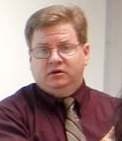
Has it been almost six months since we've moved in to our new home at Golden Belt? Amazing! So much work has been done in this time to make the renovated space feel like "Shodor." While the construction crew continues to make progress on a shrinking punch list, staff and students have installed new machines, tried various furniture geometries, and started to decorate the space with the various awards and accomplishments of Shodor. I am especially pleased we were able to save the library shelves that had been built for us by our dear friend Dick Hamaker (Dick passed away a few years after finishing the shelves, and he left us many of his own science and engineering books); these now have a new home in the front hallway of our space at Golden Belt!
As we are settling in, we are hardly taking a breather as so many opportunities this spring and summer are taking shape. We have had one of the largest enrollments for our Saturday explorations program, while additionally starting a new group of students in the Shodor Apprenticeship Program (you can see this year's class at http://www.shodor.org/about/apprentices).
This year we are also expanding our summer explorations to encompass new topics in science and parallel computing. With all of this, Shodor staff are working across the triangle and across the state to expand opportunities for students in other communities to experience a Shodor-like workshop or class in modeling and computing skills. Our international program also sponsored its first trip- a workshop at Dublin City University in Ireland- for teachers in the Noyce Scholarship program. And I am writing this letter to you from Melbourne, Australia where I have been working to develop new computational science classes and programs with Monash University and the John Monash Science School, a magnet school for high school kids across Victoria.
While expanding outside of the Durham area, we are looking to expand our after-school offerings as well, so that students near our new center can more easily participate in activities at Shodor. Patricia Jacobs and others have been working on this, making contacts with the East Durham Children's Initiative and Eastway Elementary.
Thank you again for all you do to help us. We value your friendship, encouragement, and support! Please stop by if you haven't already to share in the excitement of the new Shodor!
All the best,

Bob Panoff
Two Shodor Students Recognized As Herald-Sun "Student of the Week"
BY Hillary Stoker, Staff
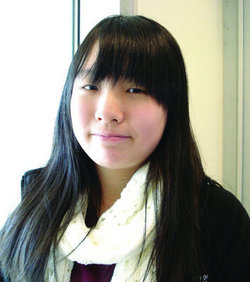
Recently Shodor intern, Maya Gouw, was named a Herald-Sun "Student of the Week". As the second Shodor student to earn this award, Maya, a sophomore at City of Medicine Academy, has been working at Shodor since 2009, first as an apprentice and now as an intern. This past Spring Maya worked mainly on updating web development tutorials used to teach apprentice classes. "I love it," Maya said of working at Shodor. "The staff is really nice. They're all amazing people. They're really smart - way smarter than you could ever think." Outside of school and Shodor Maya enjoys creating digital art and has been the recipient of numerous art awards including five silver keys earned in the 2011 Scholastic Art Awards. Maya was selected as the Herald-Sun "Student of the Week" because of her strong interest in math, science, and art.
In 2011 Shodor intern Cameron Aviles was also identified as a Herald-Sun "Student of the Week" for his strong commitment to his school work and also to his local community. Cameron began at Shodor as a YO Durham student, participating in the Shodor Apprenticeship program. Since graduating from both "YO Durham" and the Shodor Apprenticeship program Cameron has continued working at Shodor as an intern.
Saturdays at Shodor
BY Austin Galny, Intern
This Spring, Shodor is offering SUCCEED Saturday Explorations workshops focused on learning and discovery in math, science, engineering and technology. Shodor continues to partner with North Carolina Central University (NCCU) to offer these workshops. Saturday Explorations take place for 6 weeks and alternate between locations at Shodor and NCCU.
Workshops held at NCCU focus on environmental science. Dr. Vinod of NCCU teaches an introductory workshop on electricity entitled CyberStorm. The CyberStorm workshop involves hands-on experiments, internet research and computational activities to help students learn about hurricanes. Students also learn about the latest technologies such as satellites, sensors and supercomputers that scientist use to predict the path of a hurricane.
Workshops located at Shodor focus more on technology and math. In addition to giving students some insight into how graphics-- from visualizations of molecules to the latest hollywood effects-- are created with computers, this workshop acquaints students with some free graphics tools that they can continue to use at home. Students use these tools to create their own two-dimensional visualizations. All of the examples presented in this class have a particular focus on the use of computer graphics and visualization as a teaching and research tool in science, mathematics, and engineering.
Many students are excited to learn about science using technology that they don't normally have access to at their middle schools. One workshop student said, "I liked creating the hurricane models and seeing them come to life almost like a video game".
For more information about Shodor workshops, please visit http://shodor.org/calendar.
Shodor Partners With Kramden Institute
BY Brandon Beckwith, Intern
Shodor and the Kramden Institute are joining together to bring computational science to students in North Carolina. Both organizations have similar missions, to empower students through the use of computational science and technology. The resources they provide to students compliment one another to achieve the united goal bettering math and science education.
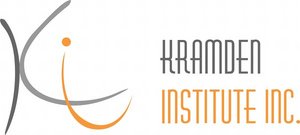
The Kramden Institute, located in Durham, began in 2003 and essentially an educational recycling center that has awarded over 2,000 refurbished computers to deserving students in this year alone. Since it's beginnings Kramden has awarded over 9,000 refurbished computers to students grades 3-12 in North Carolina. Kramden's core belief is that every student should become fully computer literate in order to thrive in our interconnected world. Having reached over 9,000 students to date, Kramden is very excited that they have the will be awarding their 10,000th computer in the early part of this year.
In partnership with Kramden, Shodor has installed their Interactivate software on each computer that is awarded out by Kramden and will providing Kramden staff with training to demonstrate the uses of Interactivate. "Shodor focuses on content, and Kramden provides a way for students to get a computer to use that content to learn and to explore math and science. This is a wonderful opportunity for us to work together to promote learning for more of the area's students," says Dr. Robert Panoff, Shodor's Executive Director.
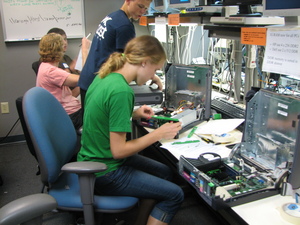
Together each organization (Kramden and Shodor) is working to spread the use of technology and computational science in their local communities, doing so through outreach programs and educational resources. This will hopefully give students who are less fortunate a better opportunity to achieve their goals and fulfill there potential in the technology field. "We're thrilled for Kramden and Shodor to partner together and make a real impact in helping economically disadvantaged students bridge the digital divide across North Carolina," said Kramden executive director Michael Abensour.
This partnership is sure to impact the Durham community by creating better opportunities for students to excel in math and computer science.
Noyce Scholarship Opportunity in Dublin
BY Jenny Jones, Staff
In partnership with the European Union's Pathway Project (http://www.pathway-project.eu/), Shodor, along with four pre-service teachers from the United States, traveled to Dublin City University in Dublin, Ireland to train teachers in the use of computational science as a method of inquiry-based education. The workshop included in-service teachers from in and around Dublin City, faculty from Dublin City University, partners from across Western Europe (Belgium, Germany, and Wales), and pre-service teachers from the U.S. The American teachers included Erin Chafe from Virginia Tech, Joel Smith from the University of Tennessee Knoxville, Lisa Berry from the University of Tennessee Chattanooga, and Aaron Willey from Wake Forest University.

The four pre-service teachers from America who also participated in this workshop were chosen because of their participation in the Noyce Scholarship program. The Noyce Scholarship is awarded to pre-service teachers who will teach math or science in high needs schools upon graduation. This opportunity was designed to offer Noyce Scholars the opportunity to collaborate with teachers internationally and enjoy a cultural experience that would inform their teaching. As the first group of Noyce Scholars to have this experience, participants were formative in developing the framework for future participants. Before leaving for Dublin, these four pre-service teachers enjoyed a day in Shodor's office in Durham to develop a method to evaluate the effectiveness of the workshop. For them, this meant creating blogs that they updated throughout the trip, developing a pre-workshop survey that they also filled out before leaving, and a post-workshop survey that they completed when they returned to America.

The workshop itself consisted of two days of intensive training in computational thinking, various computational tools, and the pedagogy behind using those tools in math and science education. Joel Smith even said, "The wealth of tools presented in the workshop were staggering in their ability to facilitate learning and truly promote multidisciplinary approaches to content." He went on to say, "I have already downloaded the MathFlyer app and I am currently thinking of ways to incorporate that into future lesson plan development."
The resources are only one small part of the story, though. Participants also learned how to use modeling to teach science through inquiry rather than lecture. One participant said, "I plan on using this experience to help mold my teaching methods in the future." Another participant shared one lesson they're already developing, "I will be working on a lesson that uses Easter Island as a model for the advancement and decline of a community that competes for limited resources. I can use the modeling techniques to model populations changes and changes in available resources."
All of the participants expressed interest and/or plans to share what they learned. Aaron Willey, from Wake Forest University, is already planning to talk to others in her program, as she said, "I am also planning on holding a brief session with my fellow colleagues at Wake Forest so I can share my experiences with them." She adds, "I would love for Shodor to come to Wake Forest and hold a workshop!" Meanwhile, Lisa Berry, of the University of Tennessee at Chattanooga, is looking at other ways to share the information: "I will be meeting with my department head this week and I can't wait to show him all the modeling tools that are available."
The workshop in Dublin, Ireland will obviously have a lasting effect on all involved. What's more exciting, though, is watching how participants will take what they learned and spread it to their own schools and universities. Aaron Willey summed it up best in saying, "I gained more than I know how to put into words."
Where Are They Now? Victoria Nneji
BY Kristen Ross, Intern
Victoria Nneji was first acquainted with Shodor when she was in middle school, attending various workshops such as Biomedical Science and Forensic Science. From there the relationship grew when she was invited to apply for Shodor's apprenticeship program. Now Victoria is a sophomore in Columbia University's Fu Foundation School of Engineering and Applied Science studying Applied Mathematics and Economics.
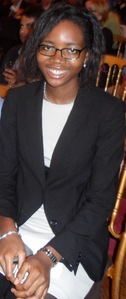
At Shodor Victoria developed her computational science skills and a passion for math and science. This passion motivated her to apply for and attend the North Carolina School of Science and Math. In the summers following her apprenticeship, Victoria continued to seek experiences similar to those she had at Shodor. She found these experiences through various programs such as Summer Ventures in Science & Math, American Chemical Society's NC Project SEED research program, several programs with Google and the University of North Carolina at Chapel Hill.
One of Victoria's most memorable experiences at Shodor was meeting Monte Evans and hearing his story. He was Shodor's first intern, who then attended North Carolina School of Science and Math and eventually obtained graduate degree. "He was walking and talking proof that I could overcome whatever circumstances and pursue my dream," she says. Hearing of his experiences helped Victoria realize that she could be successful in computational science.
Victoria leaves some advice to current students considering their futures, "I advise them to write down their life goals, not based on how they will gain or prosper, but how they will positively impact other people's lives." Also, students need to "keep the present in mind. There are things you have to do today in order to be prepared for the opportunities that may be presented to you at any given moment.
Shodor Staff Returns to Alma Mater to Present Physics Seminar
BY Gala Taylor, Intern
Shodor Computational Mathematics Mentor and Internship Coordinator Jennifer Houchins returned to her Alma Mater, East Tennessee State University (ETSU), on February 6th to present a physics seminar entitled: Moving beyond Powerpointlessness: Building STEM Curriculum with Computational Thinking and a Parallel Perspective. Her presentation focused on "providing attendees with an introduction to Shodor and its wide range of free online resources in science, technology, engineering, and mathematics (STEM). Seminar attendees learned what it means to 'move beyond Powerpointlessness' and how Shodor employs computational thinking in the classroom. Incorporating a parallel perspective, the talk explored ongoing efforts to incorporate High Performance Computing (HPC) technologies into computational science curriculum in order to address the growing complexities of computing paradigms."
Houchins was excited about returning to ETSU to give back to her school community. It was there that she received her first computational physics course taught by Dr. Don Luttermoser. "It was this particular course that helped me realize that I wanted to pursue graduate studies in computational mathematics. It shaped both my academic and professional career paths. And I still use many of the things that I learned in that course in my work at Shodor," said Houchins. Houchins grew up in East Tennessee, so in addition to returning to her Alma Mater, she was also looking forward to returning to the beautiful foothills of the Appalachian Mountains, seeing her parents, and enjoying some delicious Ridgewood barbeque!
SUCCEED Workshops Summer 2012
BY Brittany Coleman, Intern
Interested in math, science, and/or computers? Well, look no farther, because Shodor is hosting exciting hands-on interactive computing workshops this summer that cover these topics! Aren't that interested in math or science? Participate in our workshops you may find that you do like these topics and be surprised how math and science affect the world around you.
Shodor has workshops for youth in grades 6-8th and 9-12th. Not only will you have fun, you will learn more about math, and science, sharpen your computer skills, and much more! These amazing workshops range from forensics to web design. Just take a look!
-
Explorations in Engineering (6th-8th and 9th-12th):
- Want to be an engineer or find out what an engineer does? Then take this workshop. Students will learn what it takes to be an engineer and learn concepts like circuitry and the principles of structural engineering, including how computer models aid in design.
-
Intro to Programming Concepts (6th-8th and 9th-12th):
- o In this workshop students focus on the basic essentials of algorithms and computer programming. Throughout this course students will be creating and running a model from a unix command line.
-
Intro to Web Design (6th-8th and 9th-12th):
- This workshop gives students the opportunity to be able to create their own websites from scratch. Participants will use skills such as HTML and CSS to add text and create backgrounds as well logos for their website.
-
Math Explorations (6th-8th):
- This workshop covers topics like probability, graphs, patterns, correlation, variables, measures of central tendency (mean, median, and mode), etc. Students have the opportunity to play games and create their own graphs, patterns or ratios to help explain each topic.
-
Forensics (6th-8th):
- Like to solve mysteries? This is the perfect workshop for you. Students in this workshop investigate a "crime scene" at Shodor and then have to use their wits and computer skills to find the culprit. Many times, it's whom you least expect! Students hold interrogations and receive help from a virtual police dog that they create.
-
Modeling Your World (6th-8th):
- o This workshop has students demonstrate various ways to display data or a model. Students will use Agentsheets, Vensim and Netlogo to study such topics as the spread of diseases and the ecosystem.
-
Graphics and Visualization (9th-12th):
- Like video and computer games? In this workshop students will create their own basic graphics. By the end of the week students will be able to to create your own game that can be played online.
-
Shodor's Scholars Program (9th-12th):
- This two-week program incorporates elements of all the SUCCEED workshops into one. Not only will students learn about different topics from different workshops but they can combine all of them together to make their own website with various models on them. This workshop helps prepare students for the SUCCEED Apprenticeship program at Shodor.
For more information please visit, www.shodor.org/calendar for more information.
Nothing Greater Than Math Flyer in 2012
BY Levi Diala, Staff
First introduced to the app store over the Summer of 2011, Math Flyer has undergone a host of upgrades to usability and key features. Based off of the flagship applet, Multi-Function Data Flyer, Math Flyer was Interactivate's first transition to mobile devices. Now, Math Flyer has grown to support a variety of features both consistent with the aims of original applet as well as some new ones that take advantage of Apple's unique iDevice interfacing.
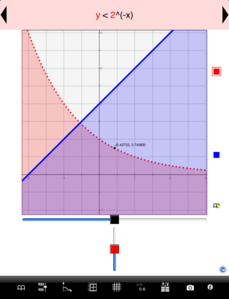
The newest capability from the latest update allows Math Flyer to graph inequalities! No matter the function, Math Flyer can graph 'greater than' 'less than' and 'equals to'. But the fun doesn't stop there! Math Flyer allows the user to differentiate between 'greater/less than' and 'greater/less than or equal to' by using a dotted line plus shading to represent solely 'greater/less than' and a solid line plus shading to represent 'greater/less than or equal to'. This latest update did not remove any previous usability or functionality from Math Flyer, as the user can still plot up to eight functions and use the plethora of key features already available. In addition to being able to graph inequalities, the user can also change the line thickness of their functions on the settings page. Adjustable line widths become extremely important for instructors when they are projecting Math Flyer for the entire class.
To recap, Math Flyer's key features now include a library of preset graphs that the user can save additional ones to as needed, adjustable range and parameter settings, trace mode, windows settings, grid line darkness settings, a fraction to decimal and vice versa converter, a camera button, and a resources page that includes a list of math lesson plans that can take advantage of features provided by Math Flyer.
In today's mobile world, Math Flyer truly lives up to its name, providing Math Graphs On The Fly.
For more information on Math Flyer, or to purchase, please visit http://shodor.org/mathflyer/.
Partnership With LearnNC and Spring Professional Development Course
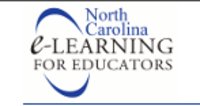
For the third year in a row Shodor is offering a professional development course for middle school and high school math, science, and technology teachers. The course, hosted by LearnNC, explores the myriad of free resources available to faculty through the National STEM Digital Library (NSDL). Participants learn to use this collection of resources to find and implement the tools most relevant to their classroom. In individual and group activities participants learn strategies for searching, self- reflection, and identifying resources. Participants also review and discuss lessons learned within and throughout the course. In a final culminating project, participants take advantage of the resources explored in this online course and create a lesson plan personalized for their uses. This Spring the course was taught in February by Shodor staff member Jenny Jones.